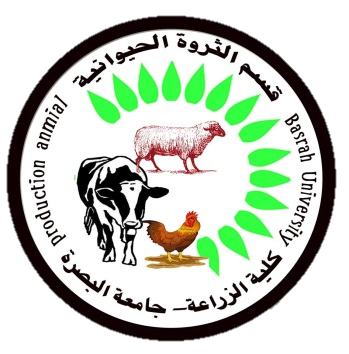Contact the Department:
For any inquiries or additional information about the Department of Animal Production, please contact us via:
Address: College of Agriculture, University of Basrah, Basrah, Iraq
History :
The department was established in 1971-1972 with the establishment of the College of Agriculture, as it was among the five departments that formed the college at that time. The department aims to prepare specialized cadres in the fields of livestock and is interested in conducting scientific agricultural research. And conducting scientific plans for the preservation and upgrading of livestock through improving animal production of all kinds. The department follows the animal field, which includes a large variety of farm animals of different ages and faithfulness. Practical lessons are given to undergraduate students, and research is conducted by the faculty members of the department and graduate students. The department also contributes to the scientific and administrative supervision of the animal production branches in the field and to the training of students, which contributes effectively to the preparation of graduates well. Undergraduate students do practical training in the field during the study of the semester subjects, as well as during the summer training to get acquainted with the different field operations that take place in the poultry halls and animal production pens. The Department of Livestock includes a group of faculty members in the fields of animal and poultry nutrition, animal physiology, artificial insemination, genetics, animal breeding and improvement, meat technology and sheep breeding and production. and feed industry, as well as adopting programs aimed at serving and developing the community.
Research of the department :
Study the performance and behavior of local waterfowl and the possibility of benefiting from them and domesticating them commercially.
Studying the nature of desert plant structures and their use in creating economical diets for feeding ruminants.
Studying the nature of the genetic structures of working animals and conducting genetic improvement processes for their economic and productive traits.
Studying physiological criteria related to reducing abortion rates and stillbirths in agricultural animals and raising productivity through artificial insemination.
The use of non-traditional local feeds in the manufacture of animal feeds at low economic costs while preserving their integrated nutritional elements.
Study and improvement of Iraqi buffalo production in southern Iraq. Studying the efficiency of the performance of Iraqi camels in the southern region and an attempt to establish herds for breeding.
Breeding quail birds and raising the efficiency of their production and spreading their breeding in the southern region.
Biotechnology related to animal production sciences, particularly reproduction, genetics, breeding, and improving meat characteristics.
Improving the productivity of local sheep and goats. Functions and tasks of the livestock department Develop and update the department's curricula for the primary and higher studies.
Develop the department's research plan and follow up its implementation. Developing and updating teaching and scientific research methods for students and faculty.
Selecting and nominating faculty members to provide consultations to state institutions, community service, and participate in local and international scientific conferences and symposia.
Communicate with the corresponding scientific departments in local and international universities to develop expertise and benefit from the experiences of others.
Performance evaluation and follow-up of the scientific development of teachers and students.
Holding training courses to raise the efficiency and expertise of agricultural extension agents, breeders and field owners on a regular basis.
Vision The Department:
Aspires to be a high-level scientific center that enhances the process of scientific and technical progress, provides scientific and practical advice for investment projects, and contributes to economic development through the development and development of livestock in Iraq.
Department message:
Commitment to preparing agricultural engineers who are in line with the needs of the labor market, able to compete and contribute to the development of the fields of animal production, by following the latest advanced educational systems, and applying environmental conservation and community service systems.
Objectives;
Preparing specialized technical cadres in the field of animal production to improve the status of livestock.
Developing and implementing scientific programs in the field of livestock sciences. Implementing academic and applied research in the various branches of animal production and providing appropriate solutions to problems in this field.
Adoption of international quality standards in the work of the department and in various axes.
Participation in the continuing education system to spread scientific knowledge and to ensure the development of the expertise of workers in the field of livestock.
Providing scientific consultations and holding specialized scientific courses for workers in government agencies related to livestock.
Preparing and organizing scientific seminars and conferences in the field of livestock.


